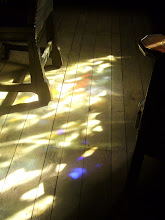"You have just dined, and however scrupulously the slaughterhouse is concealed in the graceful distance of miles, there is complicity."
--
Ralph Waldo EmersonI think I've always been a vegetarian at heart. Growing up, I wouldn't eat meat unless it was de-boned, fried, and virtually unrecognizable as animal flesh. One of my high school friend's parents would always tease me when I was over for dinner by assuring me that there were no bones in whatever meal we were about to consume: salad, pasta, chocolate cake. There has always been something unsettling to me about eating an animal, a being that breathes, moves, feels, and--yes--loves. It seemed to ago against my very nature, my own being.
I didn't become a vegetarian because I wanted to be healthier, though I certainly am now, but because my conscience could not bear the weight of so many innocent lives. I began to wake up in the night with dreams of animal slaughter, and finally decided to follow a truth I'd felt (often only subconsciously) for most of my life: that animals were not meant for my consumption, that they were not created to serve my appetite, that they were meant to be free beings, not slaves.
I have never been evangelistic about my vegetarianism. I have not handed out pamphlets, worn T-shirts, or preached in front of Burger King. I have not tried to convince anyone that they are going to hell for eating animals. But often when others find out that I am a vegetarian, they immediately put up their guard and begin to defend themselves, to express their opinions about animals in really obnoxious ways. I sometimes wonder if there is not a tiny speck of conscience that tells them they may be wrong, a speck of self-doubt. There must be.
If we eat meat, eggs, or dairy products, wear leather, fur, or wool, the truth is that we are complicit in a great deal of cruelty. I am guilty of much of it. (I too sport my wool jacket and love my cheesy lasagna.) Factory farming is a greedy, cruel, disgusting business that robs of animals of dignity and a natural existence. If you picture your beef coming from happy cows on a family farm, you are mistaken. Factory farm animals are brutalized, live their entire lives in spaces so small they cannot even turn around, and are often fully conscious when their feathers are boiled off, their hide is skinned, parts of their bodies are lopped off. I am a vegetarian because I cannot bear the thought of being complicit in the torture and horrible death of innocent animals.
I think it is a tragedy to never question these things because it may be inconvenient to you. You may have to start buying cage-free eggs or organic milk, or buying organic meat--God forbid. You may not be able to scarf down a Big Mac quite so blithely. We are happy to think that we are nice to animals, that we would never torture and murder them, but we are as complicit in their deaths as the slaughterhouse workers, as the greedy business owners and factory farmers.
Gandhi said that "the greatness of a nation and its moral progress can be judged by the way its animals are treated." Abraham Lincoln expressed similar sentiments. If this is the case, America is probably the most depraved country in the world. We consume most of the world's resources, and it has been said that the grain we feed to our farm animals would be sufficient to end world hunger. This may be an oversimplification, but there is truth there. Is a steak really worth so much pollution and waste and suffering? I can't imagine so.
I am still considering my own complicity in the suffering of God's creatures. I regret my new wool coat; I want to give up any non-organic dairy products. I want to be more careful about the cosmetic and cleaning products I buy, know exactly what's in my vitamins...I want to care enough to do all I can to alleviate the sufferings of others, to be inconvenienced for the sake of mercy. Jesus wasn't a vegetarian, but I bet if he lived in today's horror land of factory farming he would be.

